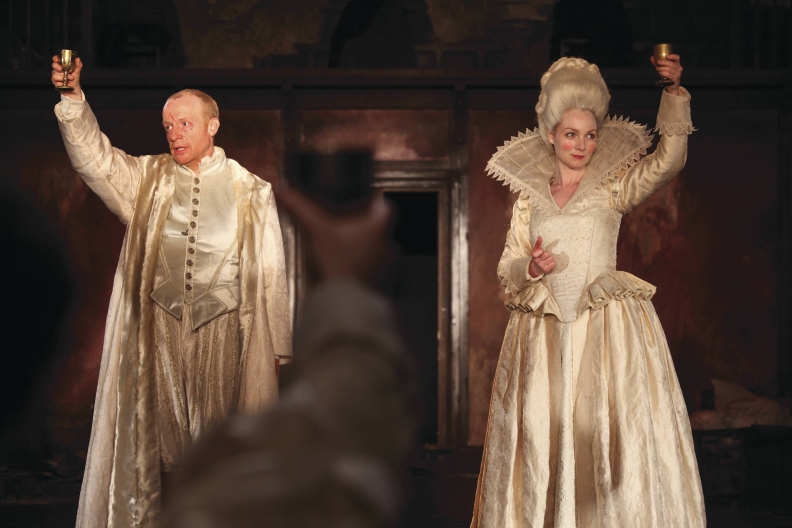Part of our series of posts that focus on a key character from exam set texts. Offering alternative interpretations and insights, these are ideal for sharing with students as they revise and prepare for their English Literature exams.
We are often told that Lady Macbeth challenges the stereotype of women. It has become a stereotype in itself to describe her as a ‘strong’ woman, a ‘powerful’ woman, a woman who ‘challenges our expectations of women’… But what was Lady Macbeth really like? What is her first name?
Think about the following questions:
- Would she take sugar in her tea?
- Would she run the London marathon?
- Would she be a good parent?
What I notice when I am working with students is that they don’t explore the complexity of Lady Macbeth. Their interpretations are limited to those which support this one idea.
Below are some of the reasons why students think she is powerful and some alternative interpretations:
A desperate woman
She exploits the witches’ prophesies, using them to justify the idea that Macbeth should be king.
Perhaps this is the mark of a desperate woman – so far, she has been unable to provide Macbeth with a surviving heir – if she can’t (as she sees it) secure his bloodline, so perhaps she can provide him with the ultimate power instead.
Perhaps as a woman at the time she would have been genuinely afraid to deny the witches’ predictions. If the ‘instruments of darkness’ are at work, is she fearful of defying them?
Manipulative?
She is manipulative and controls her husband.
She encourages Macbeth to think in a certain way, but he has already admitted to his ‘black and deep desires’. So when Duncan announces that Malcolm will succeed him, Macbeth clearly states ‘that is a step / On which I must fall down, or else o’erleap, / For in my way lies.’ He has made up his mind before he has spoken to his wife.
Typical of the stereotype
She is willing to murder king Duncan.
No, she isn’t. She is willing to plan the murder and to assist in the crime but she is horrified to find that the sleeping king reminds her of her father – this in itself suggests a sensitive, woman with a depth of emotion which actually makes her more typical of the stereotype. Or is this simply an excuse for the fact that she finds herself unable to drive in a knife – again more typical of the stereotype.
She feigns a fainting fit to distract attention after the murder.
It is possible that Shakespeare intended her to be genuinely overcome by events. Macbeth is expanding his story at this point – asking how anyone who ‘had a heart to love’ could stop himself from killing the men he claims have murdered his king. Does this remind Lady Macbeth of the gravity of their crime to the point where she cannot cope with the hypocrisy of it all? The fact that the couple share a line here could suggest that she cuts across him because she can’t bear to hear any more.
Lack of control
She takes control when Macbeth believes he sees Banquo’s ghost at the banquet.
In some respects she doesn’t take control at all – she tries to calm Macbeth and draw his attention to his strange behaviour but her lines are relatively brief and, in the end, she simply dismisses the guests in an uncontrolled fashion, ‘Stand not upon the order of your going, / But go at once.’ Her desperation and lack of control are quite clear – she ushers them all away and can only suggest afterwards that Macbeth should ‘sleep.’
We do not see Lady Macbeth again until she is herself unable to sleep peacefully. The final scene in which she appears is that of a woman sleepwalking and giving away her deepest secrets. It is perhaps this final scene which confirms that she is no hardened powerhouse of a woman. Like a child ‘She has a light by her continually’; she is restless, plagued by the blood on her hands even though these are murders she has not actually committed herself – certainly the murders of Banquo and Macduff which she refers to were not any of her doing. In this scene she is presented as haunted and broken so if she were the warrior queen so many have argued for, why would she be so deeply affected by these crimes and why would she kill herself?
It is possible that she would take sugar in her tea, run the marathon for charity and make a lovely mother. It is possible she is a vulnerable woman, desperate to please – or even appease – her husband and is unable to cope with having had any part in the horrors with which he has ‘supped full’.
What’s her first name now?*
Take a look at the Oxford Literature Companion study guide and student-friendly write-in workbook for Macbeth. Oxford Literature Companions are ideal for use in the classroom or as revision and include activities designed to prompt a closer analysis of the writer’s language, as well as tasks on characters, themes and contexts.
* You will find the answer in our Oxford Playscripts Lady Macbeth which is ideal for introducing this character to your 11-14 year old students.
- Macbeth: In defence of Macbeth
- Macbeth: Banquo – No More Mr Nice Guy
- An Inspector Calls: Gerald Croft
- Revising quotations: One Quote Fits All

